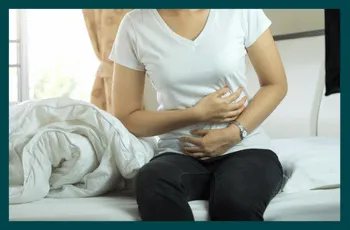Types of stomach pain in women & possible causes
Written by Editorial staff writer at Hola Medically reviewed by Dr Gosagan Gopalakrishnan, BSc (Hons), MBChB, DRCOG, MRCGP, FRACGP

Contents

Stomach pain is a common experience for many women, often transforming a typical day into an unanticipated struggle. From patterned menstrual cramps to the mystery of ovulation pain, our bodies have a distinctive way of signalling that something is wrong. Understanding these different types of pain can be like cracking a code–helping us determine the cause and recognise when to seek assistance. Let’s dive into the intriguing world of stomach pain and learn what it reveals about our health!
Different types of abdominal pain in women
Women's abdominal discomfort varies depending on its location, origin, and intensity. Here are the main forms:- Generalised pain: This type of pain spreads across the belly and is frequently caused by digestive problems such as indigestion, gas, or viral gastroenteritis.
- Localised pain: Localised pain is focused in a single region and typically indicates an organ problem, such as appendicitis (lower right side) or gallstones (upper right side).
- Cramping pain: Associated with menstruation, IBS, or dietary intolerances, this pain comes and goes in waves.
- Sharp pain: Sharp or stabbing pain is often abrupt and powerful, and it can be caused by illnesses such as kidney stones, ovarian cysts, or ectopic pregnancy.
- Chronic or intermittent pain: Recurrent pain, such as endometriosis or chronic pelvic inflammatory disease, can linger for weeks or months.
Experiencing these symptoms? Speak with a doctor within 15 minutes.
See a Doctor now
Available 24/7, across Australia.
Location of pain within the abdomen
The location of abdominal pain typically reveals information about its source. Here's the breakdown by area:- Upper right quadrant: Pain here might suggest gallbladder problems (such as gallstones), liver difficulties (hepatitis), or kidney stones.
- Upper left quadrant: Common reasons include stomach ulcers, pancreatitis, and spleen problems.
- Upper middle (Epigastric): Often associated with acid reflux, gastritis, ulcers, and some cardiac problems.
- Lower right quadrant: Linked to appendicitis, right ovarian disorders (such as cysts), or kidney stones.
- Lower left quadrant: Often associated with diverticulitis, left ovarian problems, or kidney stones.
- Lower middle (Pelvic): Pain here may indicate menstrual cramps, endometriosis, or urinary tract infections.
- Central abdominal: Indigestion, irritable bowel syndrome (IBS), and early appendicitis are all associated with the central abdominal region.
Potential causes
Abdominal pain in women can stem from various factors, often varying based on the pain's location and characteristics.1. Digestive issues:
Digestive issues may include conditions such as gastro-oesophageal reflux disease (GORD), which leads to discomfort in the upper abdomen or chest, and gastritis or peptic ulcers that cause pain in the upper middle or left abdomen. Irritable bowel syndrome (IBS) results in cramping and bloating, typically worsened by stress, while gallstones can produce sharp pain in the upper right abdomen.2. Reproductive factors
Reproductive factors include menstrual cramps, which result in lower abdominal pain, as well as endometriosis, associated with chronic pelvic pain. Ovarian cysts can lead to one-sided lower abdominal discomfort, particularly if they rupture, and ectopic pregnancies cause severe localised pain during early pregnancy3. Urinary issues
Urinary issues cover urinary tract infections (UTIs), resulting in lower abdominal pain and discomfort when urinating, as well as kidney stones, which induce severe, cramping pain that travels to the lower abdomen.4. Inflammatory conditions
Inflammatory conditions such as appendicitis and diverticulitis produce specific localised pain, while hernias and muscle strains can result in targeted discomfort. Determining the root cause is crucial for proper treatment.What kind of stomach pain is alarming?
Certain kinds of abdominal pain may point to serious issues that need immediate medical attention. Intense, sudden discomfort—especially if it feels sharp or stabbing—might suggest appendicitis, ruptured organs, or ectopic pregnancy. Ongoing pain that lasts for several hours, particularly if it intensifies, should be assessed by a professional. Pain focused in the lower right abdomen could indicate appendicitis, while localised discomfort in the lower left abdomen may suggest diverticulitis, both of which are alarming conditions. If abdominal pain is accompanied by fever, vomiting (especially with blood), or significant shifts in bowel habits (like diarrhoea or blood in the stool), urgent medical care is necessary. Quick swelling or bloating in the abdomen along with pain can signal a serious issue as well. Timely evaluation is crucial for accurate diagnosis and treatment.Home care
Home care for abdominal pain can help alleviate discomfort and manage mild symptoms, but it’s important to consult a healthcare provider if the pain is severe or persistent. Here are some effective home care strategies:- Rest: Give your body time to recover by avoiding intense activity and obtaining enough sleep.
- Hydration: Stay hydrated by drinking plenty of clear fluids like water, herbal teas, or clear broths, especially if you have nausea, diarrhoea, or vomiting.
- Heat therapy: Placing a heating pad or hot water bottle on the belly might assist in relaxing muscles and relieve cramping or discomfort.
- Dietary changes: Eat bland, easily digestible meals (such as bananas, rice, pureed apples, and bread) and avoid spicy, fatty, or oily foods that may irritate the stomach.
- Over-the-counter medications: Depending on the source of the discomfort, over-the-counter drugs such as antacids, ibuprofen, or acetaminophen can help relieve symptoms; however, always follow dose recommendations.
- Gentle exercise: When tolerated, simple exercises such as walking might aid digestion and relieve gas buildup.
- Monitor symptoms: Keep track of any changes in pain, bowel habits, or additional symptoms to report to your healthcare provider if necessary.
When to seek a doctor’s appointment?
If you have abdominal pain, schedule a doctor's appointment if the pain is severe or comes on suddenly, particularly if it feels sharp or stabbing, as this may suggest a serious issue like appendicitis or an ectopic pregnancy. Ongoing pain that lasts longer than a few hours or gets worse over time should also lead you to seek medical help. Furthermore, if the pain is centred in the lower right or left side of your abdomen, and is accompanied by fever, vomiting (especially if it contains blood), or significant changes in bowel habits (such as diarrhoea or the presence of blood in your stool), you need to seek immediate medical attention. Rapid swelling or distension of the abdomen along with pain is another critical warning sign. Timely evaluation is essential for accurate diagnosis and treatment.Is telehealth a good option?
Telehealth is a useful resource for tackling abdominal pain, especially in non-emergency cases. It enables easy access to medical professionals, allowing patients to share their symptoms, get guidance, and assess the need for face-to-face appointments without the hassle of commuting. However, in cases of severe or abrupt abdominal pain, an in-person assessment is essential to exclude serious health issues. All in all, telehealth acts as a helpful addition to conventional healthcare methods.With Hola, opt for:
- Telehealth Doctor Consultation: Speak with a licensed doctor anytime, 24/7, to discuss your symptoms.
- Online Prescription: Get prescribed medication, anti-sickness medications, and rehydration solutions, if required.
- GP Referral: Receive referrals for specialists, tests, or further treatment when necessary.
- Medical Certificate Online: Request a certificate for work, school, or documentation purposes.
- After-Hours GP: Access medical advice during evenings, weekends, and public holidays.
Need time off to recover? Get your medical certificate online within 15 minutes.
Request a medical certificate
Available 24/7, across Australia.
What we treat
- Cough
- Nausea & vomiting
- Fever
- Hayfever
- Fatigue
- Sore throat
- Acne
- Hair loss
- Gout
- Eczema
- Rosacea
- Sunburn
- UTI
- Erectile dysfunction
- Contraception
- Morning sickness
- Morning after pill
- Prostate health
- Anxiety
- Depression
- Stress
- Grief & loss
- Antidepressants
- Premature ejaculation
- Asthma
- Blood pressure
- Blood thinners
- Diabetes
- Cholesterol
- Migraines & headaches
- Allergies
- Body ache
- Heartburn & reflux
- Sleep disorder
- Pain relief
- Gastro
Related Articles
Disclaimer
This blog is for general informational purposes only and does not indicate that Hola Health provides all treatments or preventive measures mentioned. It is not intended to be a substitute for professional medical advice. Always seek the guidance of your doctor or other qualified health professional with any questions you may have regarding your health or a medical condition. For emergencies please immediately contact 000. Any medical topics discussed are intended to educate, not to imply availability through Hola Health.
 Facebook
Facebook  X
X  Copy Link
Copy Link



